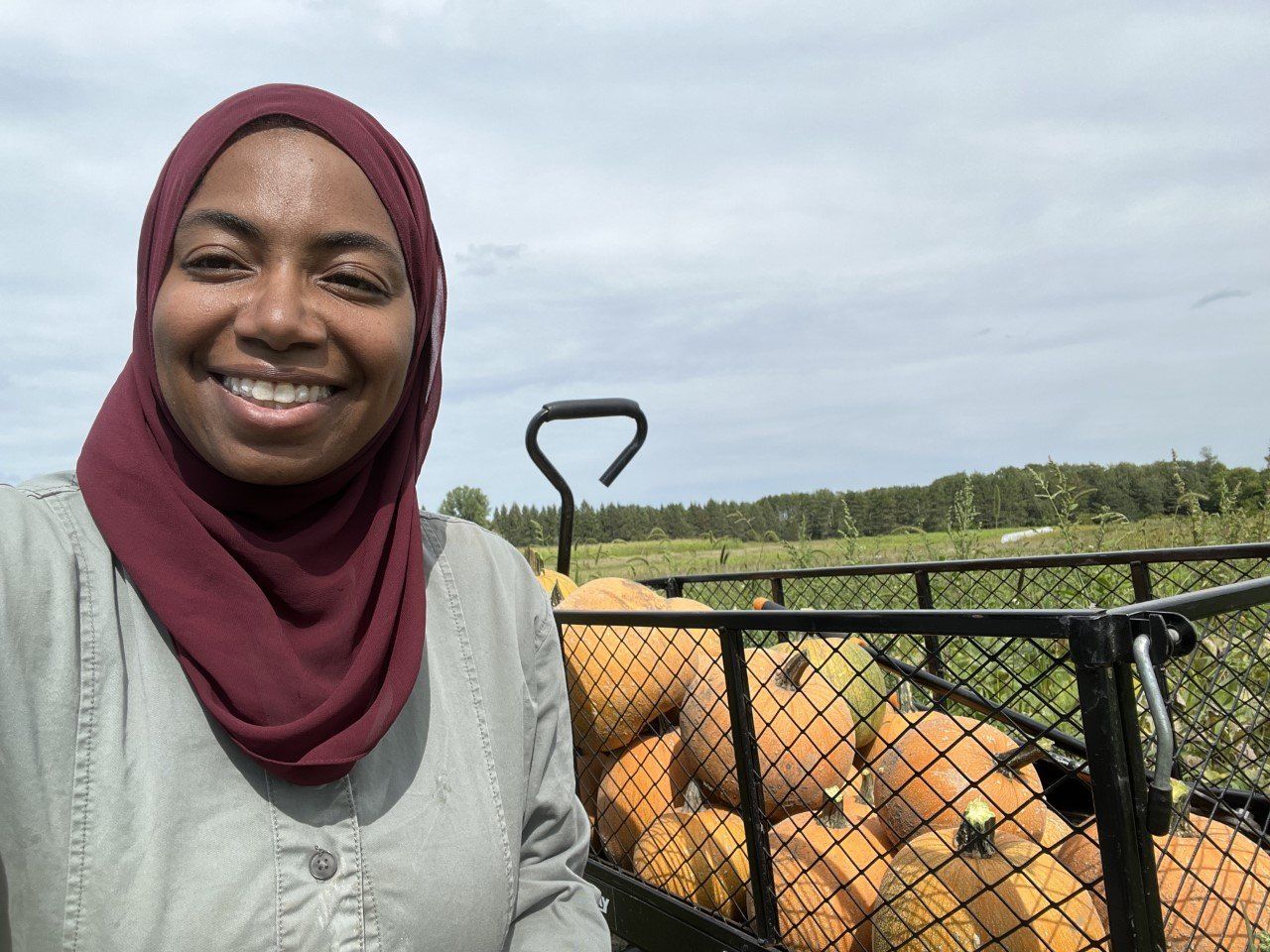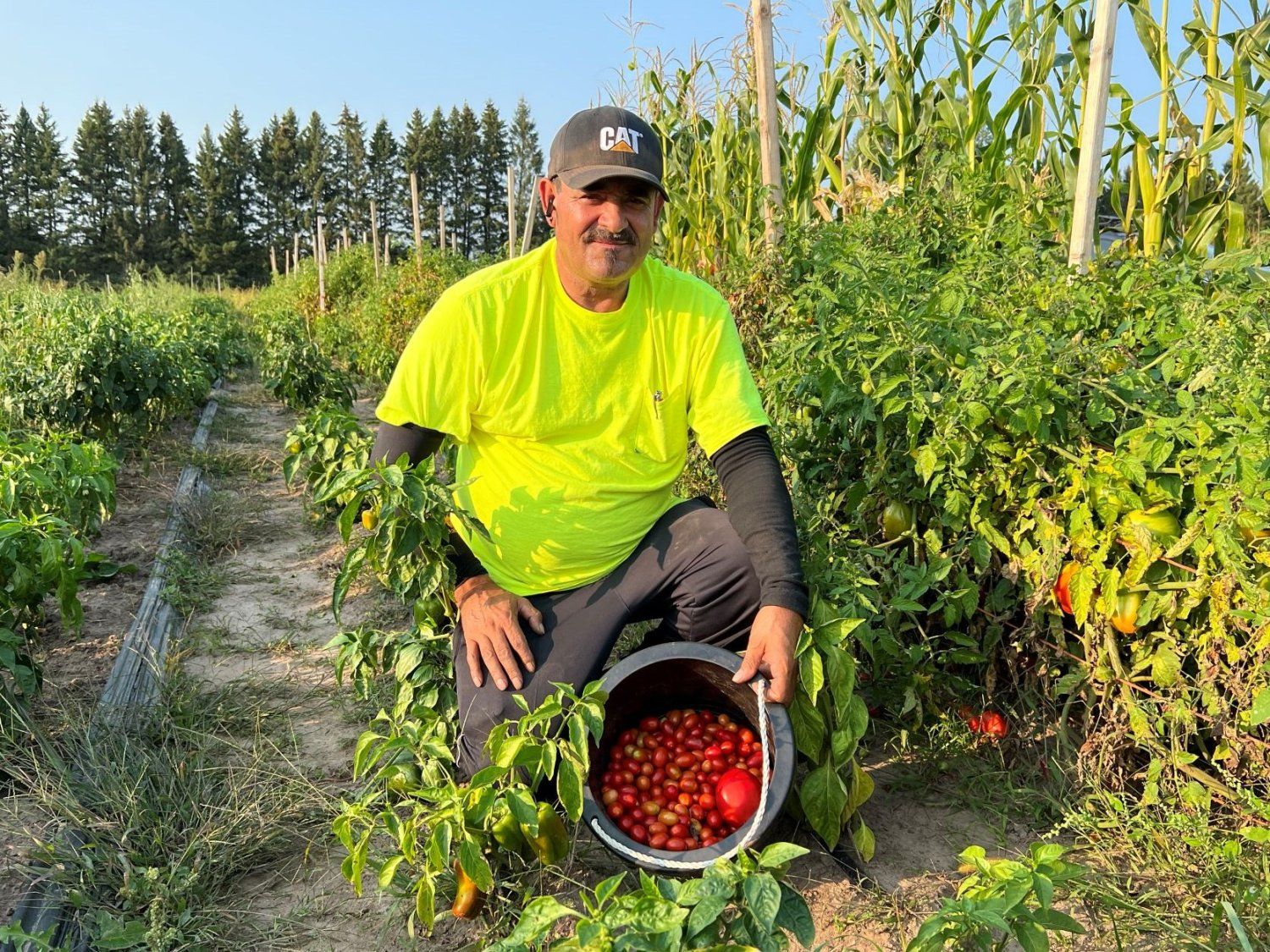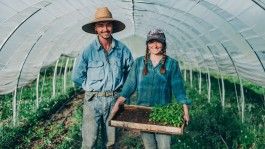Did you know - we have 17 farmers in our education program this season at Big River Farms, 13 of whom we source weekly veggies from to fill your CSA share? Meet BRF farmers Eleanor & Pearce of StrongHeart Farms!
Tell us about your farm!
Eleanor: StrongHeart Farms is a mixed vegetable operation located on two rented acres of farmland, one at BRF and one in Schafer, MN. We primarily sell at the Stillwater Farmers Market, through our own independent CSA and BRF’s aggregated CSA, and to The Food Group's food shelf program.
This is our second year growing at BRF. We focus on regeneratively grown food and reciprocity with the earth – giving back to both the land and the community. The food we grow is chemical-free, nutrient dense, and regeneratively raised. We pay particular attention to soil health – soil health equals healthy food, which equals healthy people!
We have 3 caterpillar tunnels in the field at BRF this year that were sponsored by the Lakewinds Organic Field Fund. These are primarily used for season extension, allowing us to grow more early spring and late fall crops, plus tomatoes, hot peppers, basil, and lettuce during the summer.
Pearce: I graduated college in 2018 and discovered a beginning farmer program called Rogue Farm Corps in central Oregon, then applied and got accepted. I interviewed with some host farmers and lived on-site for a season with an established farmer. I also visited other farms, restaurants, and wholesalers to get some behind the scenes insight. The farm I worked with hired me over the winter (Rainshadow Organics) and Eleanor was hired on to be their Communications & Markets Manager for a few seasons. I became the Assistant Farm Manager and managed the field crew and hosted farm events.
At Rainshadow Organics, we learned so much about local food systems and how it positively impacts water and soil health, climate, people, community health, etc. It really opened our eyes to the interconnected relationships between food systems work and environmental and communal health.
We moved back to MN in August 2020 and began searching for farmland and beginning farmer programs here. We applied for the BRF farmer education program in November 2020 and started farming here in 2021.
Do you have a favorite or impactful farm memory?
E: When the frost hit around October 20th last year, we needed to harvest our potatoes at our plot in Schafer. I called some friends to help me with a full day of potato harvesting. I brought a camp stove and heated up water for tea for everyone. It was a great experience!
What is your relationship with farming and/or organic food?
P: Rainshadow Organics is a full diet farm – they have meat and dairy cows, pigs, chickens, mixed veggies, and grains. 80% of our diet was grown on this farm in Oregon when we worked there. It was our first immersion into the organic food world and the true flavors of freshly harvested veggies. First and foremost, it opened our eyes to the impact of our food decisions.
E: My main relationship to farming and food is knowing where my food comes from and how it was grown, establishing relationships with the land and the farmers that grow or raise it.
What has your experience been so far at Big River Farms? How has the BRF program impacted you
Land access is huge for beginning farmers, especially those that need the time to develop systems and a business. Affordable land access and infrastructure at BRF makes it really accessible. BRF is a safe space – it allows you to make mistakes without fear of loosing your business or defaulting on a loan (as you start out small and gradually grow and expand your business). Having access to well-maintained farm infrastructure is another huge benefit (i.e., storage coolers, pack shed, cleaning stations, tractors, hand tool library, etc.)
Of Note: Eleanor helped establish BRF’s new hand tool library and visual check-out system to reduce language barriers for beginning BRF farmers who don't speak English as a first language.
Are there any surprises you've experienced along the way?
Pests! The climate in Oregon where we farmed was very arid and there was far less pest pressure and mold/rotting of veggies. Two consecutive years of summer droughts in MN have been a surprise too! Getting the Lakewinds grant was a great surprise too – more than $7,000 that covered our Cowsmo compost (40 yards) and materials to create three caterpillar tunnels in our fields. Knowing that there is a local community here that wants to support new farmers has been great.
Of Note: Eleanor created an Integrated Pest Management (IPM) Guide for BRF’s farmer education program in spring 2022.
What challenges have you faced as an 'emerging' farmer?
Individual customer access – reaching individuals to inform them about our CSA and farmers markets. Creating an initial customer base as an emerging farmer has been challenging, especially coming from a well-established farm in Oregon that had a solid customer base. Learning what scale to grow at has been a challenge – we more than doubled our production of land from 2021 to 2022 and have had to learn more about our own capacities and thresholds to handle the increased workload.
What do you enjoy about being a small business owner?
E: Seeing return customers at farmers markets! Knowing our CSA and farmers market customers' names and veggie preferences is incredible and helps us establish long-lasting relationships. We also get to flex our diversity of skills and knowledge – we’re constantly learning something new every day!
P: Being a small business owner allows us to create our own goals and processes based on our values while not having to adjust our operations based on another business owner's needs.
So far, what's been your biggest success?
P: Having a 25 person CSA in year two of farming has been a big success! We doubled from 12 CSA members in 2021 to 24 this year (through advertising in the MN Grown CSA directory and adding some new drop site locations).
What do you hope for the future of your farm?
E: I hope we can diversify to have more offerings and products (i.e., chickens, eggs, pigs, cattle, etc.), moving more toward the full diet farm model. We’ll also continue to grow our independent CSA program.
P: Timewise, we hope to be at BRF another 2-3 years and will eventually try to get a USDA Farm Service Agency (FSA) loan to buy our own farmland nearby.




